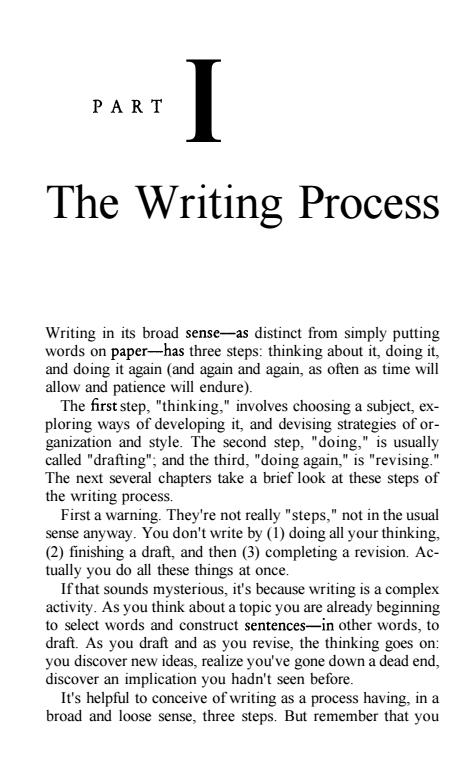正在加载图片...

PART The e Writing Process Writing in its broad sense-as distinct from simply putting words on paper-has three steps:thinking about it,doing it, and doing it again (and again and again,as often as time will allow and patience will endure). The first step,"thinking,"involves choosing a subject,ex- ploring ways of developing it,and devising strategies of or- ganization and style.The second step,"doing,"is usually called "drafting";and the third,"doing again,"is "revising." The next several chapters take a brief look at these steps of the writing process. First a warning.They're not really "steps,"not in the usual sense anyway.You don't write by (1)doing all your thinking, (2)finishing a draft,and then (3)completing a revision.Ac- tually you do all these things at once. If that sounds mysterious,it's because writing is a complex activity.As you think about a topic you are already beginning to select words and construct sentences-in other words,to draft.As you draft and as you revise,the thinking goes on: you discover new ideas,realize you've gone down a dead end, discover an implication you hadn't seen before. It's helpful to conceive of writing as a process having,in a broad and loose sense,three steps.But remember that youPAR T I The Writing Process Writing in its broad sense—as distinct from simply putting words on paper—has three steps: thinking about it, doing it, and doing it again (and again and again, as often as time will allow and patience will endure). The first step, "thinking," involves choosing a subject, exploring ways of developing it, and devising strategies of organization and style. The second step, "doing," is usually called "drafting"; and the third, "doing again," is "revising." The next several chapters take a brief look at these steps of the writing process. First a warning. They're not really "steps," not in the usual sense anyway. You don't write by (1) doing all your thinking, (2) finishing a draft, and then (3) completing a revision. Actually you do all these things at once. If that sounds mysterious, it's because writing is a complex activity. As you think about a topic you are already beginning to select words and construct sentences—in other words, to draft. As you draft and as you revise, the thinking goes on: you discover new ideas, realize you've gone down a dead end, discover an implication you hadn't seen before. It's helpful to conceive of writing as a process having, in a broad and loose sense, three steps. But remember that you